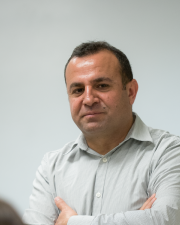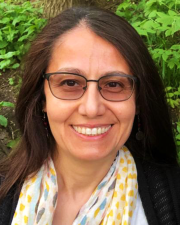100 years of the Republic of Turkey/Türkiye

This one-day mini-conference commemorates the Turkish Republic’s 100-year anniversary through a series of talks by experts in the politics and society of Turkey/Türkiye. Each presenter will take an important theme that relates to the broader scope of the history of the Republic and, in various ways, discuss issues of change, continuity or cycles in this theme within the last 100 years. These themes will capture Turkey’s politics, state and society relations, the Kurdish issue, and Turkish foreign policy, culminating in a final roundtable to discuss the direction the Republic is headed over the next 100 years.
Conference Schedule

9:30am

9:45am
In order to understand some of the chronic challenges to democratic politics in Turkey over the last 100 years, there is benefit in exploring the roles and legacy of two (arguably tragically) under-appreciated political leaders that were significant players at two different junctures in the Turkish political system, İsmet and Erdal İnönü. While İsmet İnönü has often been maligned in popular discourse, Erdal İnönü has largely been forgotten. However, this father and son combo highlight, not some sort of game-changing ideology or policy, but the characteristics of leaders that contribute to a healthy democracy. Their political careers highlıght three characteristics whose absence from the repertoire of other notable political elites and leaders in Turkey have plagued the political system and hampered the development of democratic norms at the elite level.

11:00am
In the 1920s and 1930s the new Turkish state created a number of new national holidays ranging from Children’s Day, Youth and Sports Day, Language Day, and Victory Day to, perhaps most importantly, Republic Day. By focusing on National Sovereignty and Children’s Day, this presentation will reveal how the new national days functioned in ways similar to the cultural and political reforms of the new regime. The new holidays not only served to distance the new republic from its Ottoman past, they also provided an important site for the new state to connect with the society on a regular basis and in a positive way. Public participation in the celebration of national days, especially the participation of school children year after year, contributed to the building of a secular national identity in the early years and decades of the republic. Over time, several of these national days became institutionalized and continued to support the persistence of an emotional attachment between individual citizens and the Turkish nation beyond the RPP years

1:00pm
US Secretary of State Antony Blinken, during his confirmation hearing in early 2021, criticized Turkey for its ties with Russia and stated that Turkey is not acting as an ally to the US. In May 2023, Turkish President Erdogan extended his rule into a third decade in what the Times called “the most important election of 2023.” The election was closely watched by the United States, NATO, and Vladimir Putin, who has maintained close ties with the Turkish president. This is a new Turkey.
In October 2019, the Trump administration ordered American troops to withdraw from northern Syria, where the US had been working with Kurdish forces to fight the Islamic State. Soon after, Turkey invaded parts of Syria. American vice-president Mike Pence traveled to the Turkish capital to urge the Turks to declare a cease-fire. In the end, it was Putin’s Russia that prevented Turkey from going forward with its invasion. In September 2020, at an official ceremony hosted by the White House, the United Arab Emirates and Bahrain agreed to recognize Israel’s sovereignty and establish full diplomatic relations. In March 2023, Saudi Arabia and Iran surprised the world and the Middle East with a joint statement that the two major Gulf powers would resume diplomatic relations. This time, the mediator was neither Russia nor the US; it was China. This is a new Middle East.
In between the new Turkey and the changing Middle East, however, lies the vast Kurdish geography spanning four countries, de jure and de facto Kurdish autonomous regions in Iraq and Syria, and a resilient and popular insurgency in Turkey. At its centennial as a republic, what Turkey decides to do about the Kurds will also shape its future as a country in the new century.

2:15pm
Turkish foreign policy has seen significant twists and turns in the last one hundred years. While the origins of foreign policy behavior extend to the late Ottoman period, the Republic era ushered multiple shifts in foreign policy orientations. Rather than employing periodization approaches, we can utilize three theoretical frameworks to explain the variation in foreign policy behavior. Changing prevalence of identity, security, and economic interests in domestic and international politics have created continuities and ruptures in Turkish foreign policy. In the most recent turn, economic interest increased its weight as a determinant of Turkish foreign policy vis-à-vis the security and identity. Domestic economic interests have brought about new policy strategies including international humanitarianism, cultural diplomacy, and military aggressiveness. Turkish foreign policy at one hundred has significantly departed from the vision of its founder, Ataturk, to replace Western orientation and non-adventurism with multidirectionalism and global ambitions.

3:45pm

5:00pm
Meet the Presenters
Conference Organizers & Sponsors
We'd like to thank our conference organizers, the KU Center for Russian, East European, and Eurasian Studies (CREES), the KU Center for Global and International Studies (CGIS), and the Department of Political Science at Kansas State University. We are also grateful to our other sponsors, KU Middle East Studies, and the KU Department of Political Science.




